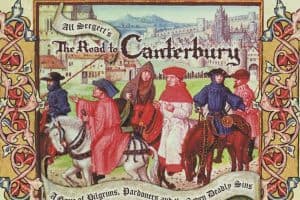“The Game Designer’s Tale”
The Chronicle of Higher Education reports on an English lecturer’s novel creation of a boardgame based on the Canterbury Tales. Learning through play?
In The Road to Canterbury, each player functions as the character of the Pardoner, traveling with seven of Chaucer’s pilgrims, each of whom is afflicted with one of the seven deadly sins. Using relic, sin, and pilgrim cards, the Pardoner tries to persuade the others that they will die if they succumb to greed. In truth, says Mr. Seegert, the Pardoner is the greediest of the lot, hoping the others will “buy his fake indulgences so they can enjoy remission of their sins and spend less time in purgatory.”
Players store their winnings in coin purses, which Mr. Seegert says is deeply symbolic: “Chaucer depicts the Pardoner as having a very indeterminate gender, and it’s as if his coin purse is compensating for what he lacks between his legs.”
“The goal in the game is to become as corrupt and wealthy a Pardoner as possible,” Mr. Seegert says. “It’s completely irony-laced. You benefit from all the evil things that you’ve done.”
Sounds like a real winner this. It’s amazing no-one has thought of it before. Next stop Paradise Lost?











